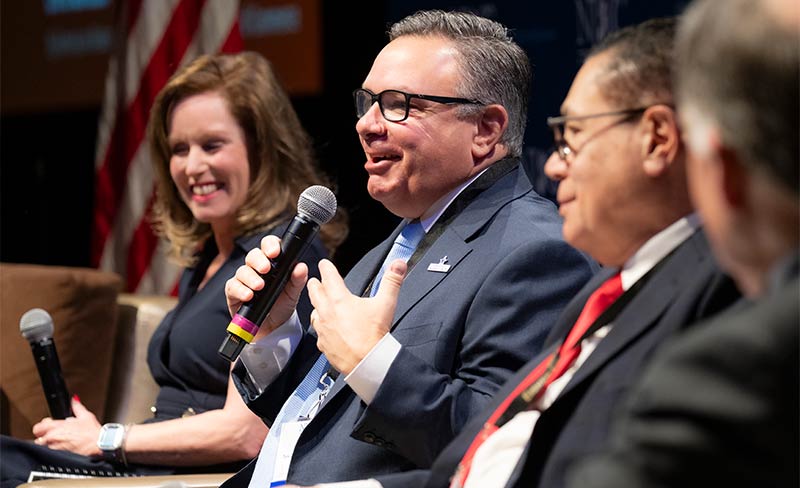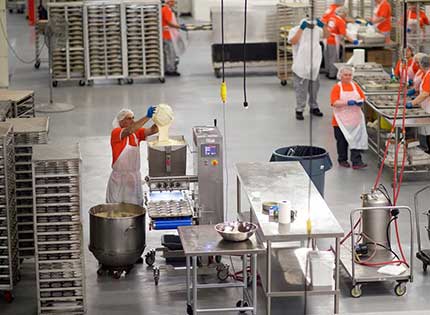Junior's might make the quintessential New York cheesecake, but its owner, Alan Rosen, has quickly learned that baking it in suburban New Jersey is much easier.
For Mr. Rosen, trading his 20,000-square-foot bakery in Maspeth, Queens, for a 103,000-square-foot facility in Burlington, N.J., has been akin to giving up a cramped city apartment for a mansion in the country. Even the adage about getting more for your money has proved true: Junior's paid $3.8 million for the sprawling property, about the price of a three-bedroom apartment in Manhattan.
"We've got grass to mow," said Mr. Rosen, strolling the grounds of the seven-acre lot on a drizzly June morning. "I'm not sure exactly where it stops; that's how you know you've got a lot of land."
He has several loading docks. Seven? No, six. No matter. At his Queens location, which will close in July, a month before its lease expires, he has only two. The cream cheese for his famous cheesecakes has to be delivered there daily because he has nowhere to store it. But in Burlington, 40,000 pounds of cream cheese hardly fills a wall of one of the company's two refrigerators, which are about five times the size of their predecessors in Queens. The bakery also has six blast freezers, which can freeze a cake solid in about two hours.
A worker at Junior's packaging chocolate cheesecake. CreditMark Makela for The New York Times
Visitors to the original Junior's restaurant on Flatbush Avenue in Brooklyn still eat cake freshly baked at the restaurant's 8,000-square-foot on-site bakery. But all other delectables will be made in New Jersey, including those sold at the company's other restaurants, in grocery stores and through its mail-order business.
Mr. Rosen, whose grandfather Harry Rosen founded Junior's on Election Day in 1950, hopes the move will propel the family business further onto the national stage, allowing it to open new restaurants (Florida and Las Vegas top the wish list) and sell to more grocery stores around the country and abroad.
The Queens bakery operated at full capacity — 24 hours a day, seven days a week — to make about two million cakes a year. Already, the company is producing as much in Burlington in a 50-hour week, with mixers, ovens and assembly lines that dwarf the ones in Queens. In the last three months alone, Junior's has added over 600 stores to its distribution list.
"We have room to breathe now," said Mr. Rosen, whose company bakes a wide variety of cakes. With all the extra space, it might eventually start a gluten-free line.
In moving to Burlington, Mr. Rosen joins a long (and growing) roster of food manufacturers and distributors that call the Garden State home. The state has been aggressively luring businesses (and enticing others to stay) with lucrative incentives, like the $30 million, 10-year tax break it awarded Wenner Bread Products, which signed a lease for space in New Brunswick last year, moving the bulk of its operations from Long Island.
Critics of the incentive programs argue that the subsidies do not create enough jobs for the money spent and, in some cases, are unnecessary. Mr. Rosen, however, said he bought the Burlington facility without any subsidies or tax breaks. He considered staying in New York, looking at locations in the five boroughs, but found them too expensive. A Bronx facility cost about $20 million.
"Cheesecake is a good business, but it's not that good," he said.
Over the last year, food and beverage companies have leased 2.1 million square feet of space in the state and 13 more companies are aiming to rent a total of 2.8 million square feet, according to data provided by the real estate company Jones Lang LaSalle. Last year, Peapod, the online grocer, opened a 345,000-square-foot distribution center in Jersey City. In April, Goya, the Latin American food purveyor, opened a 900,000-square-foot headquarters and distribution center in Jersey City, less than a mile from its former headquarters in Secaucus, which it is renovating. It plans to sell a second Secaucus plant and in July will close its Long Island facility. And this fall, Fratelli Beretta, the Italian meat company, will open a United States headquarters and processing plant in Mount Olive, N.J.
"It's definitely a trend," said Robert C. Kossar, executive managing director with Jones Lang LaSalle. The companies that are relocating to or expanding operations in New Jersey "are all over the board from farmers' markets to production to e-commerce. It's really cutting across all aspects of the food and beverage industry."
Food companies produce and distribute a product that is, for the most part, cheap and heavy. New Jersey offers two important advantages that help keep costs down: Property generally costs less to rent or buy than it does inNew York City, and the state's location puts trucks within a day's drive of 40 percent of the entire American population.
"Location becomes a very critical thing," said Robert I. Unanue, the president of Goya, sitting in his new Jersey City office, which overlooks rail yards and the Secaucus Junction train station. "We have 2,200 different items in each warehouse. If you move that more than once, it's an issue, you're losing money."
Nevertheless, Goya nearly left New Jersey for Suffern, N.Y., Mr. Unanue said. An $82 million, 10-year tax credit from the state persuaded the company to stay. Jersey City gave Goya a 20-year tax abatement, worth about $8 million. In turn, Goya built a $127 million facility on 47 acres, with a 600,000-square-foot warehouse, a test kitchen and laboratory for quality control. The company is also modernizing its Secaucus production plant, bringing a rail line to that building. It will be complete in July.
"For them, making the decision to make that kind of capital investment was certainly enhanced by the availability of the incentive," said Michele Brown, the president of Choose New Jersey, a nonprofit organization that promotes business in the state. "It made it feasible for them to do it."
Companies seeking a state subsidy are required to certify that they would leave the state without the incentive. But some doubt the sincerity of those claims. "They do this whole certification song and dance," said Jon Whiten, deputy director of the New Jersey Policy Perspective, a group that has been critical of the incentive program. "But when the rubber hits the road, it remains unclear if companies were really planning on leaving."
Goya, the largest Hispanic-owned food company in the country, built its brand by providing not only staples like beans and rice, but also Latin American specialty items like canned chipotles, tomatillos and masarepa, the ground corn flour used to make arepas. Mr. Unanue's grandfather founded the company in Lower Manhattan in 1936 by importing sardines from Morocco when he could not get them from Spain during the Spanish Civil War.
Every night, 60,000 cases of goods — pigeon peas, black beans, yellow rice and pork rinds — leave the Jersey City warehouse by truck, headed to grocery stores, bodegas and markets across the region. The new facility is less than 10 miles from Manhattan and within a short drive of the 4.3 million Latinos who live in the New York-Northeastern New Jersey region. "We have to be in this market," Mr. Unanue said.
But for Junior's, the move to southern New Jersey has not diluted the company's identity as a New York brand. The original cheesecake recipe — a closely guarded secret blend of cream cheese, heavy cream, sugar, eggs and a touch of vanilla — has not changed in 65 years. If time hasn't altered the recipe, neither will a 75-mile move, Mr. Rosen said. "I love New York," he said. "We're a New York company, but like the Jets and the Giants, we play some of our games in New Jersey."





